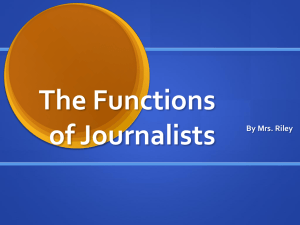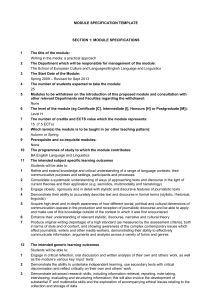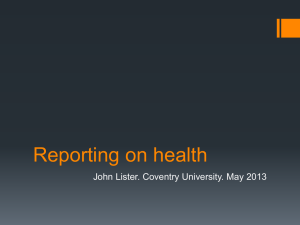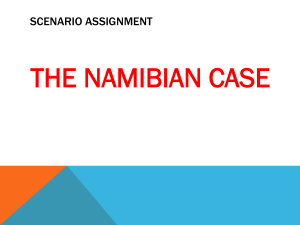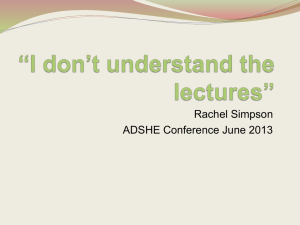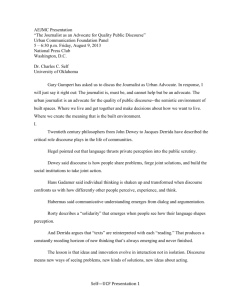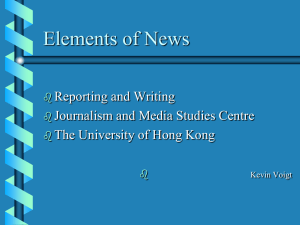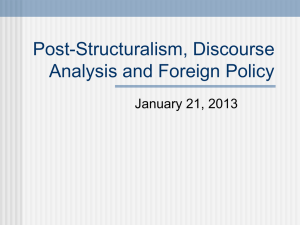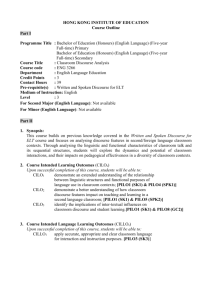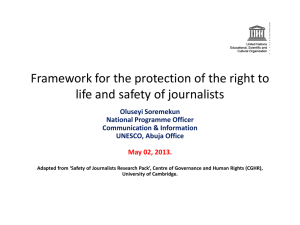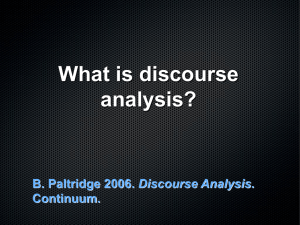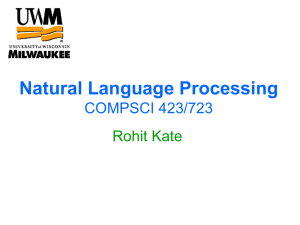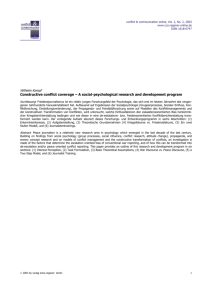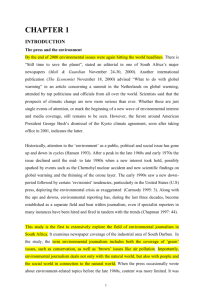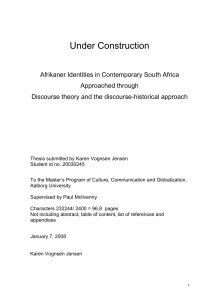Nassanga-Goretti-Linda-Sun-18-Sep-Africa-Media
advertisement
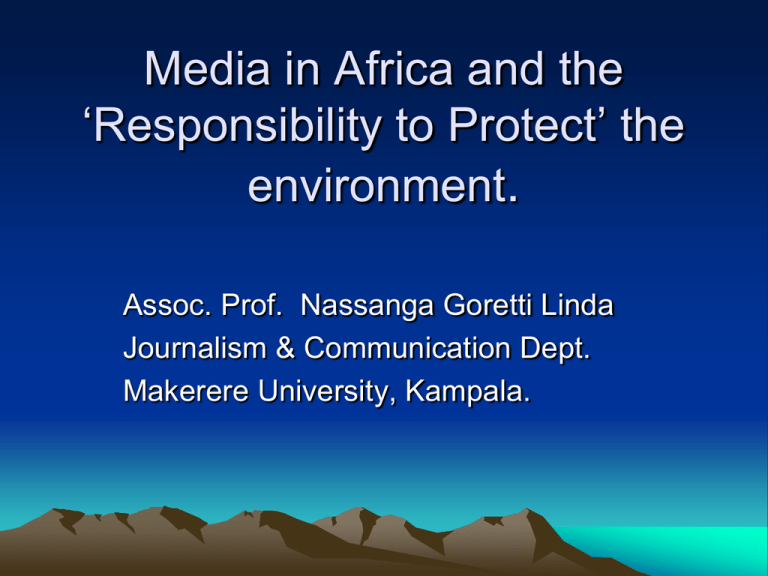
Media in Africa and the ‘Responsibility to Protect’ the environment. Assoc. Prof. Nassanga Goretti Linda Journalism & Communication Dept. Makerere University, Kampala. Highlights • Sustainable equitable development • Africa’s vulnerability and issue of global justice • Responsibility to Protect • CC in Western and Africa’s media • Capacity Gaps in reporting CC in Africa • Initiatives for improved CC coverage From Development to ‘sustainable equitable development’ • • • • efficiency in resource allocation equity in the present and future resilience of ecological & social systems adaptive capacity - assets one can access (financial, natural resource, human and social capital) Africa’s Vulnerability to CC • Low capacity for adaptation to CC - agrobased economies so feel impact of CC • Effects: increased food insecurity, spread of diseases like malaria, soil erosion, land degradation, floods, droughts, etc. • Aggravated poverty, migrations, heightened competition over resources, with high potential for regional insecurity Global injustice Global Humanitarian Forum Report (2009) • DCs: 99% global deaths due to CC • Most affected but contribute < 1% of global carbon emissions • Africa: 30/40 lowest per capita carbon dioxide emitters • 15/20 countries most vulnerable to CC • These collectively emitted < 0.7% of total carbon emissions Global injustice cont’d • • • • dependence on primary production heavy reliance on rain fed agriculture weak institutional capacity limited infrastructure & capacity for disaster management • limited financial resources Feminization of poverty • CC impacts poor people most – few/no assets • More poverty in rural than urban areas • More poor women than men • Women affected more by CC – most engaged in subsistence farming ‘Responsibility to protect’ • Premised on the commons or common resources. • Environment essential to satisfying needs of present and future generations • Shared environment ‘Responsibility to protect’ cont’d • Need for environmental protection if all benefit from it. • Marshall McLuhan: there are no passengers on spaceship Earth, but all are crew • Each one has a responsibility to protect the environment, including the media Earth/Ship is sinking Agenda-setting & framing theories in CC Communication • News selection + prioritization • based on news values, acquired in training and enhanced through practice • Media training important factor in CC discourse Agenda-setting & framing theories in CC Communication cont’d • Media as the principal source of information and opinions about science & CC • Media provide key public arenas in which social problems are framed • Journalists use words & frames to give greater weight to certain elements over others • Audiences rely on frames to make sense of and discuss an issue. Climate change discourse in western media • Studies done on CC and the media show no distinct uniform agenda • Reflected in various ways the public interprets and perceives CC • Assumption that the > in coverage would promote wider public understanding of CC Climate change discourse in western media cont’d • Americans: study on understanding of climate change revealed politically polarized opinions, divided along ideological lines. • Republicans questioned the validity of climate science & dismissed the urgency of the problem • Democrats accepted climate science and expressed concern about the issue Climate change discourse in western media cont’d • Yale and George Mason Universities views on global warming • 49% were not committed to do something about the problem • 18% were alarmed, 33% were concerned, 19% were cautious, 12% were disengaged, 11% were doubtful and 7% were totally dismissive of the idea. • All categories use media to put their case • Some: global warming is a hoax, work of ‘lunatic scientists’, a conspiracy theory backed by the UN, etc. Climate change discourse in western media cont’d • British Press: news values of conflict and controversy, + wish for ‘balance’ • partly explained the praise of dissent in CC reporting • Tone: fear-generating through use of words that establish the negative and frightful context in which climate change is discursively constructed (Olausson 2009:431) Climate change discourse in western media cont’d • Stories dramatic, alarmist tone, language of catastrophe, fear, disaster and death • Negative alarmist portrayals can be counter-productive – people get indifferent, disillusioned and paralysed by emotionally loaded doom scenarios • Controversy on normative value of balance in CC • Uncertainty among the public - CC real? Climate change discourse in western media cont’d • Swedish media: hegemonic status of the national horizons in CC reporting • Need for balance between nationalization and globalization in CC reporting • Advocate for training journalists beyond local horizon = global journalism Climate change discourse in African media • BBC study in 10 African countries (Nigeria, Ethiopia, Ghana, Kenya, Nigeria, Senegal, Uganda, DR Congo, South Africa, Sudan and Tanzania). • Research sought to find out the public understanding of climate change in Africa. • Key Issues: environmental justice = Africans least responsible, most affected and least informed about CC Climate change discourse in African media cont’d • Information flow on CC largely from the rest of the world to Africa. • Sense that environmental degradation is a localised issue whose responsibility lies with Africans themselves • measures to address CC that are devised and debated at international fora are barely reported in Africa • CC is debated more on Africa’s behalf rather than by and within Africa itself. First Aid to Africa by ‘outsiders’ Capacity Gaps to effective CC reporting in Africa • Training: Evaluation of curricula of journalism training institutions • Uganda: showed focus more on skills-oriented modules (77.3%), Communication support had < a quarter (22.7%) (Nassanga 2008) • S.Africa: training geared to meeting the needs of the international journalism community instead of local community • Training institutions increased, standard of education not correspondingly increasing. Courses too theoretical, not matching needs of the local environment (Deuze, 2004) Capacity Gaps to effective CC reporting in Africa cont’d • Claim: environment does not sell, is boring and not of interest to audience. • Inability of journalists to mainstream environment + CC in their news stories. • Lack of knowledge on institutional and governance frameworks (e.g. resource distribution, conflicts, democratic governance, human rights, etc. Capacity Gaps to effective CC reporting in Africa cont’d • Work environment: delays in availing information to journalists. • High competition, deadlines, news perishable • Media liberalisation, media pluralism, increased selectivity, some people don’t listen to key global concerns like CC preferring entertainment Capacity Gaps to effective CC reporting in Africa cont’d • Low priority of CC stories by editors = less space/airtime • Language (foreign) - a ‘central challenge’ in CC communication • Lack of sustainability of environment networks for journalists Initiatives towards improved climate change coverage • High expectations from journalists in reporting on CC and ‘sustainable development, but not adequately prepared. • Need to review the training curricula and give adequate attention to communication support modules Initiatives towards improved climate change coverage cont’d • More support to journalists and training institutions to improve their capacity in CC reporting + sustainable development. • Analytical reporting to move from eventsoriented to process-oriented journalism. • Journalists, editors & owners to give climate change issues due attention • More awareness, more public engagement in the climate change discourse. Initiatives towards improved climate change coverage cont’d • Banda (UNESCO 2010): media in Africa have a responsibility to communicate Africa’s climate change concerns. • Africans need to become active participants in the global climate change debates • Need to invest more in media development in Africa THANK YOU FOR YOUR ATTENTION
